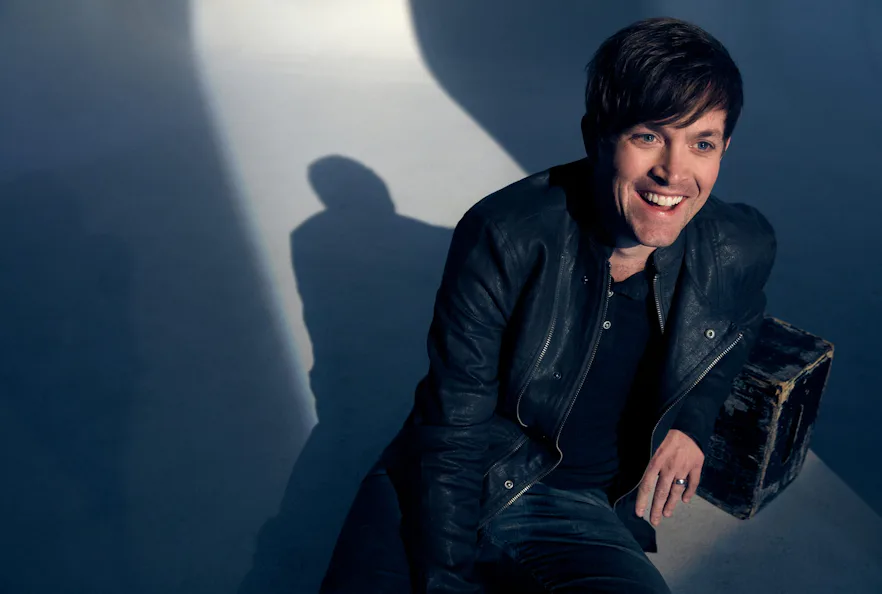My first email address was shortnsweet22345@yahoo.com. Dave Barnes laughs when I tell him; he’s familiar with email addresses like that because he’s been collecting ones just like it for 20 years. His first email list came by way of clipboards in the back of music venues, handwritten handles of 90’s identities.
In his two decades in the business Dave has written songs for artists like Tim McGraw, Carrie Underwood, and Reba McEntire. He’s opened for Taylor Swift, Bonnie Raitt, John Mayer, Lady Antebellum, Hanson, and One Republic.
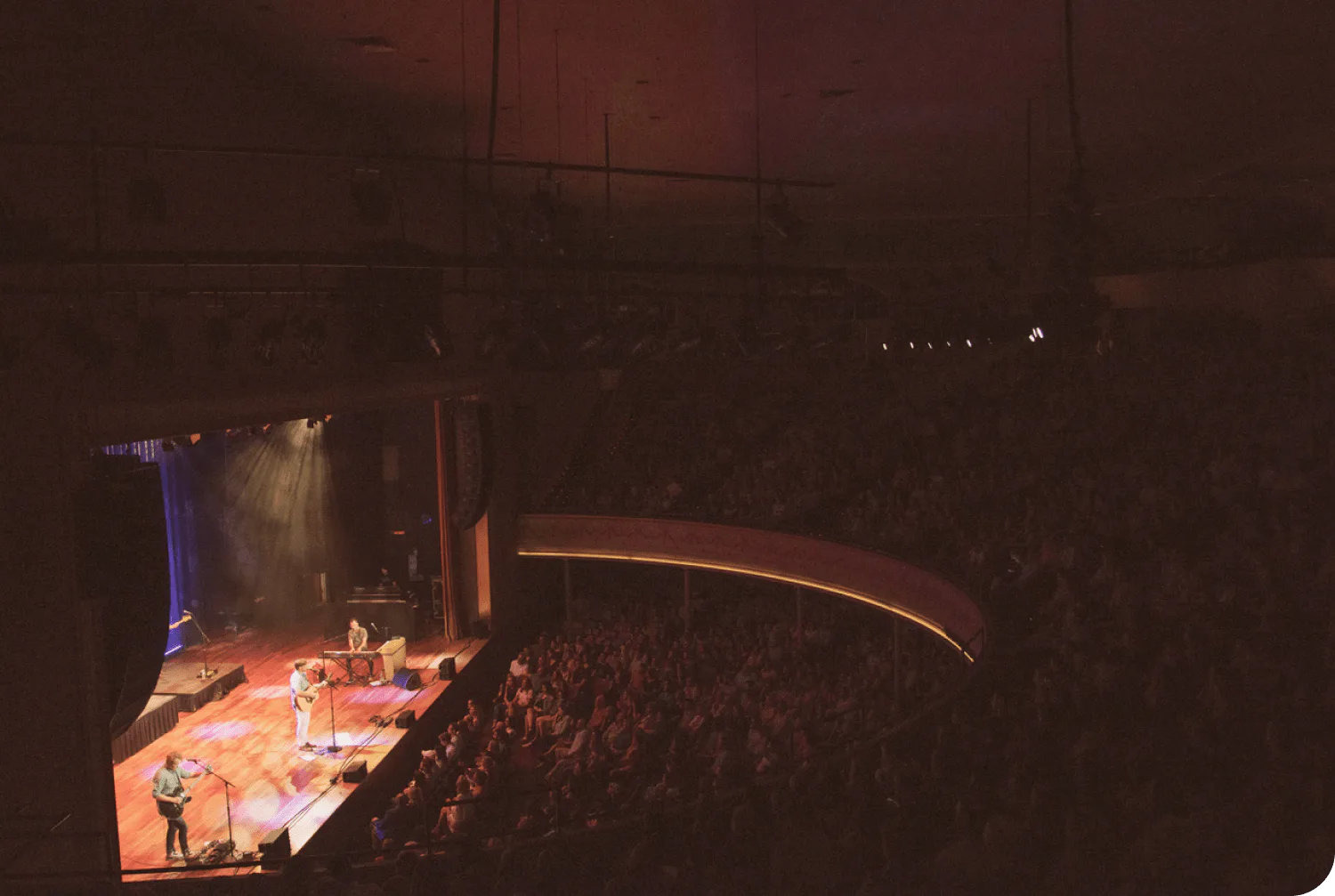
Dave playing at the famous Ryman Auditorium.
I’m sitting in Dave’s studio surrounded by stacks of old songwriting magazines, framed posters from performances at the famous Ryman Auditorium, awards from songs Dave wrote for Thomas Rhett, Billy Currington, and the one that was nominated for a Grammy with Blake Shelton.
I count six guitars and one banjo.
I scoot a little closer to the candle that’s lit on the coffee table between us. Dave is sitting at his desk-slash-keyboard. I begin by asking him questions about his long music career and how he has managed to do what so many dream of doing but so few accomplish.
“Lonely ones / You aren’t the only ones.”
It never occurred to Dave to not write songs when he picked up a guitar.
But he didn’t think of himself as a songwriter.
He didn’t know anyone who wrote songs for a living; he was just having fun, doing a thing that he couldn’t not do.
But one day spent wandering his college library changed everything.
He opened up a magazine that caught his eye – Performing Songwriter. What he found in the pages was himself.
It was the first time he approached songwriting with the question that sparks every artist’s journey: “What do I want to say?”
He read about people who made up lyrics whenever they walked, who mulled over a chorus for hours until they got it right. It was a revelation; he was like them.
He was a songwriter. “Oh, this is a thing,” he remembers thinking. It’s that moment you realize the thing you love can be more than a hobby if you want it to be, that moment you realize you aren’t alone in loving something.
The magazine revealed a community that he desperately wanted to be a part of. He missed his next college class, lost in the magazine’s pages, and from that moment on he would direct the rest of his life to becoming a part of what he was reading.
“Tears we cried / Become a lullaby / Keep on singing / Just keep singing.”
Dave wrote songs in all his free time – the only problem was that he didn’t think he had a good voice. So all his songs were written for his roommate.
But then he wrote a song that his roommate refused to sing.
It was called “Sailor’s Lullaby,” and Dave’s roommate said it was too special for him to take – he encouraged Dave to sing it.
Dave tried and thought for the first time, “I sound pretty cool singing this.” The song fit his voice well. The next thought came swiftly, almost a calling: “What would it be like to write more songs that felt like that?”
It was the first time he approached songwriting with the question that sparks every artist’s journey: “What do I want to say?”
His next instinct was to share his voice, though he laughs when he remembers his early logic: “Hey, I’ve never sung in front of people. You know what I should do? Book a show!”
“Who knew it would be so hard / Just to be myself?”
It can be paralyzing when you feel like you want to run in opposite directions at the exact same time. But what makes a creator is the willingness to live in that space.
Dave remembers the terror of the first time he entered that space, his first time singing in front of other people. “It’s like you’ve never walked before and literally people come to watch you learn to walk.”
His first show was at a church in Knoxville.
“I was nervous out of my mind. My mom and dad came, and all these people that I knew came, and all I could think was Why am I doing this? This is such a bad idea, but also at the same time feeling, This is kind of fun.”
It’s that moment you realize the thing you love can be more than a hobby if you want it to be, that moment you realize you aren’t alone in loving something.
The show wasn’t perfect. But it wasn’t a total disaster either.
He didn’t sense any fake praise or see pity in anyone’s eyes. We laugh as he shares with relief that his parents didn’t have the reaction he thought they might, something like: “We love you. You’re the best. But let’s not do that again.”
It didn’t matter that his voice wasn’t perfect or that he “fell” a few times. People responded – they really liked the songs – and that was enough for Dave to keep going.
That night his drive ignited with a decision and a plan.
Decision: “I’ve got to figure out how to do this for a living.”
Plan: “I’m just going to go until something just fricking catches on fire or falls off the rails.”
“So just keep / Dreaming in, dreaming in / Dreaming in electric blue.”
Dave moved to Nashville in 2001.
While we’re surrounded by books in his studio (e.g. Big Magic, The War of Art, The 500 Greatest Albums of All Time), Dave spent most of his early days in Nashville reading liner notes.
He’d pull out the booklets in every CD to look for answers – Who wrote the songs? Where did they record them? Who played in the band? (You can learn a lot about yourself as an artist by noticing the “fine print” you’re drawn to – fascinated by something most people pass over.)
Nashville was Performing Songwriter come to life. Dave was meeting other singer-songwriters for the first time – people with the same dream, the same drive. “I just loved that community.”
He also found himself in close proximity to artists making a living in music. The dream expanded: “I want to do what they’re doing.”
“I think the best you can do is become a soundtrack in someone’s life”
He loved the challenge, and despite the odds, he knew he wanted this with everything he had.
But first, he needed to find a way to pay the rent.
He made calls to collect on past due invoices for a modeling agency, was an extra in a prison movie, and moved armoires for an antique store.
He played shows at night at small Nashville coffee shops.
Then Bebo Norman, a musician Dave played drums for in college, gave Dave’s name to a producer, Ed Cash, who was looking for some assistant help in Nashville.
Dave did everything from babysitting Ed’s kids to picking up lunch for everyone during a recording session. Seeing Dave’s dedication and potential, Ed offered to help Dave record a five-song EP.
Soon after, a musician new to town, Matt Wertz, reached out to Dave and asked if he would open for him.
After only a year in Nashville, Dave was an opening act with an EP to sell. He remembers jokingly what it felt like to sell something like 100 CDs after a show, making $1,000 in one night in his early 20’s: “The world is mine!”
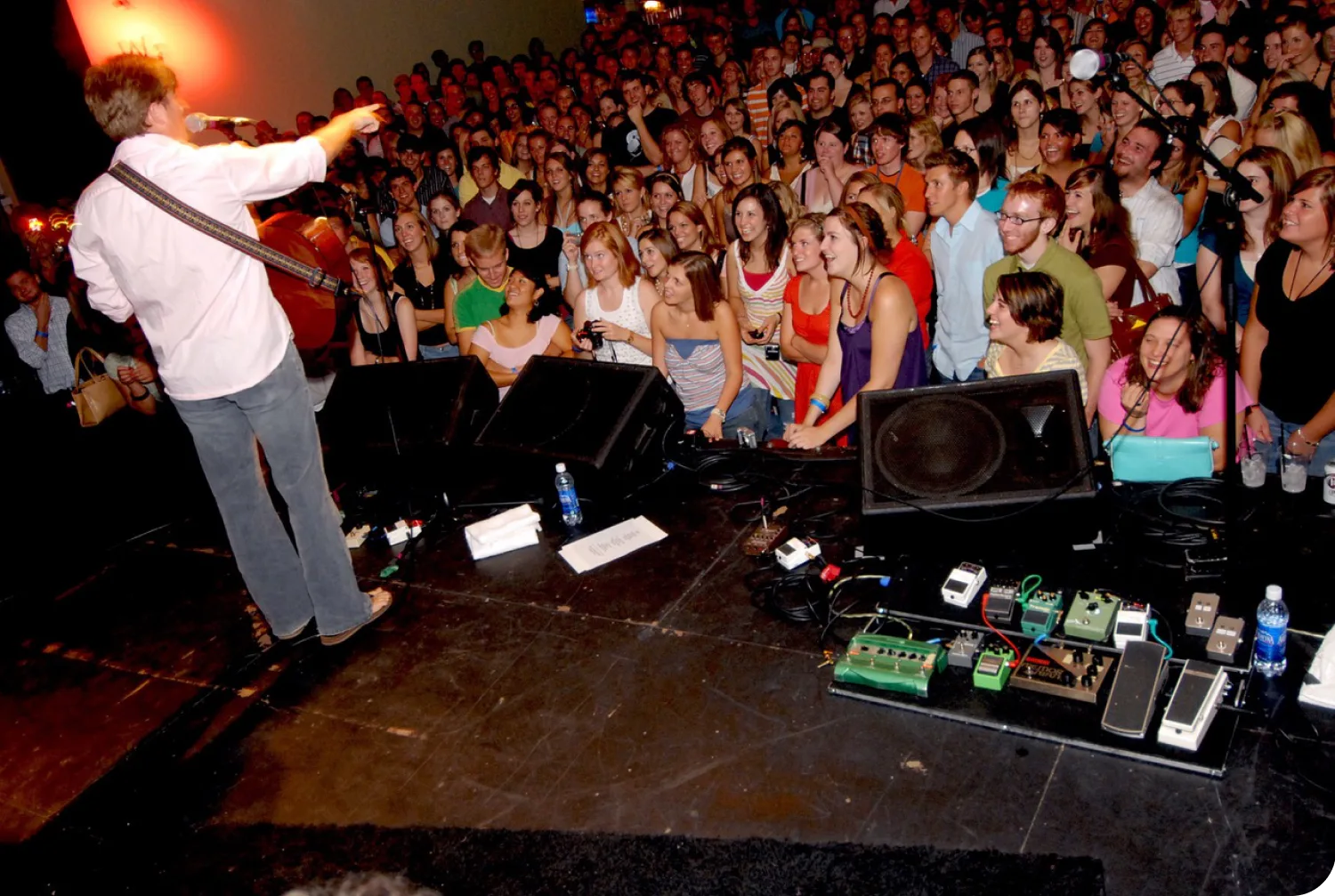
Dave playing at City Hall in Nashville.
“It seems to me that dreams I tend to dream / All happen in slow motion.”
While in retrospect it seems like things happened fast for Dave, he admits that, “At the time, it felt slow,” a side effect of dreaming big.
But the slow times are when momentum builds. You just can’t see it yet.
How did Dave get through all the waiting and doubt, aka, the lugging-armoires-and-getting-people-coffee phase?
Step one: mitigate the likelihood that decisions will be made in financial panic.
He kept his overhead low. “My rent was $300 and I had a beat-up car that helped me survive the slow lane.”
Step two: remind yourself that this pace is part of it.
Dave tried to constantly remind himself of the facts: “This stuff just takes time.”
And 20 years later, he’s still reminding himself. He stops halfway through this reminiscing and says: “I’m listening to what I’m saying right now…‘Hear it again Dave!’” He sings the last phrase with gospel-like melody.
I ask him when he started to make a full-time living as a singer-songwriter. “I’m still figuring that out today. Today’s the day.” We laugh. Because we know it’s true.
Even when things felt slow, Dave always kept going. It felt a lot like waiting, but it wasn’t passive. He wrote. He sang. He met people. He booked shows. He tried to get better – especially at singing.
People came up to him after shows to tell him that they liked his music. “Okay, and breathe,” he remembers feeling, the doubt melting away, at least for a day. It’s hard for doubt to ignore the evidence. And he was about to be presented with life-changing evidence.
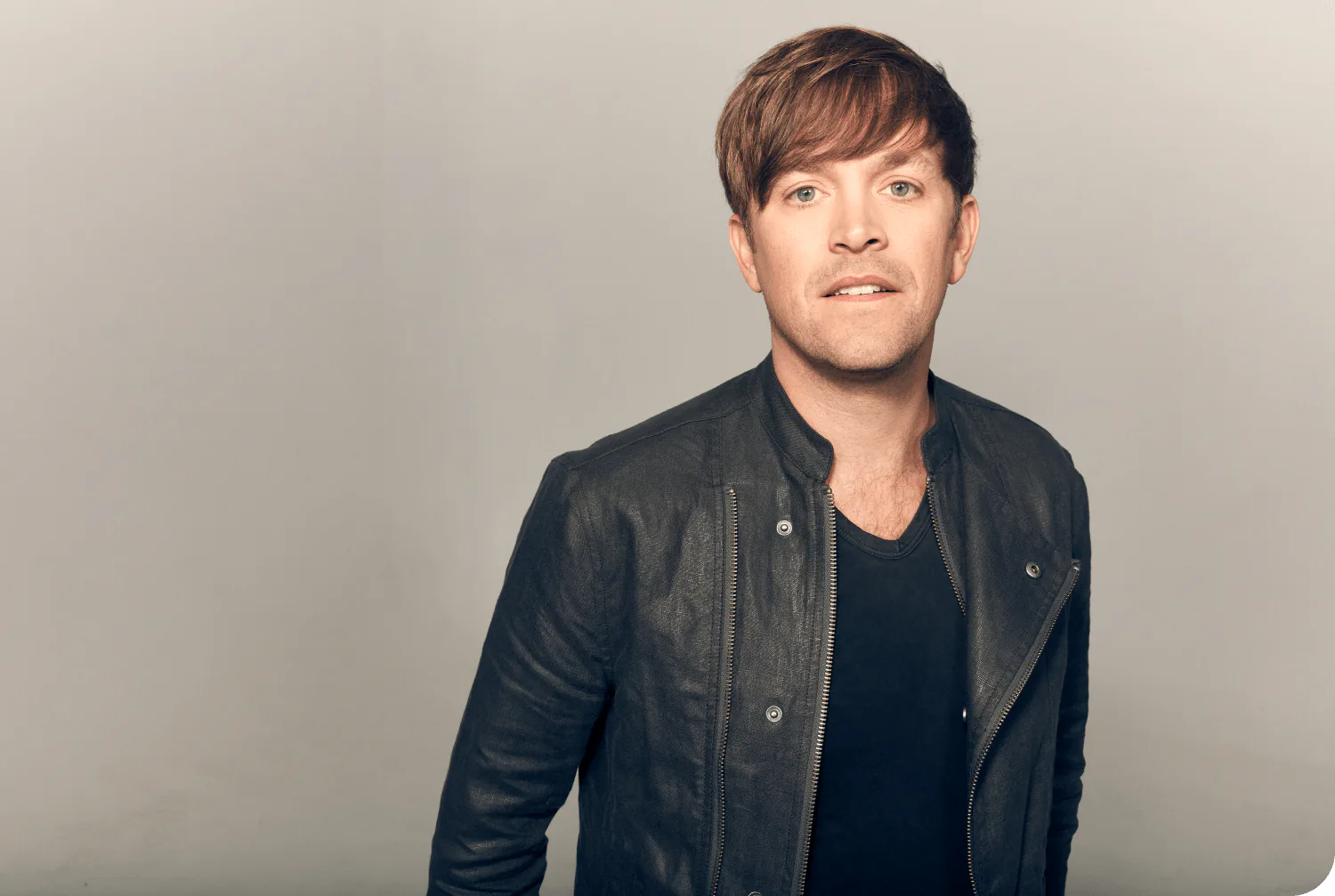
“’Cause somebody, ’cause somebody / Somebody’s gonna love you.”
In 2005 Dave walked into a bookstore with a friend. There was a book signing that day, and a woman standing near the author table called out to them: “Hey, come check this book out! It’d be a great Mother’s Day gift!”
As they walked closer Dave started whispering frantically to his friend: “Dude, that’s Amy Grant. That’s Amy Grant!”
The woman hyping her friend’s new book was a six-time Grammy-award-winning singer-songwriter who’d sold 30 million albums worldwide.
Most things in a creative journey do happen slow – but they build the foundation for the life-changing moments that happen fast.
In an act of boldness, fueled by adrenaline, Dave runs to his car to grab his CD, his first album.
He approaches Amy: “Hey, I know this is weird, but…”
He tells her about a mutual connection they have in the industry and how highly other artists speak of her. And then, the moment of bravery: “I’m a singer-songwriter too, here’s my record.” He hands her his CD. “It was weird,” he remembers. But he did it anyway.
Amy’s reaction?
“Oh my gosh, Dave, this is great. Thank you for giving me this! I’ll listen to it today.”
“Okay,” he remembers thinking.
Two days later a friend walks up to him at church and says, “Hey, I was just at this Amy Grant show and she was talking about you on stage.”
Dave responds, “I’m sorry, all of that just went ‘wah wah,” like the librarian in Charlie Brown. He asks his friend to repeat.
“From stage,” his friend explains, “Amy said, ‘This is why I love Nashville. I meet these people, and this guy Dave Barnes – I’ve been obsessed with his record. I’m trying to find him. So if you know him, find me after the show.’”
Amy Grant was looking for Dave.
He called everyone he knew who might have a connection with Amy and finally got in touch with someone who agreed to connect them.
The next day, Dave’s phone rings.
“Hello? Dave? It’s Amy.” Before he can speak, she stops him: “You just need to listen for a second. I can’t tell you how much I’ve listened to this record. I am obsessed with it. I called probably 20 other Barnes trying to find you in the phone book.”
In that moment, all the waiting stopped feeling like waiting and started to look a lot more like building. “It was a big affirmation,” he remembers, like something outside of him was saying, “Keep going. Keep going.”
Amy and her husband – multi-Grammy-award-winner Vince Gill – sang on Dave’s second album.
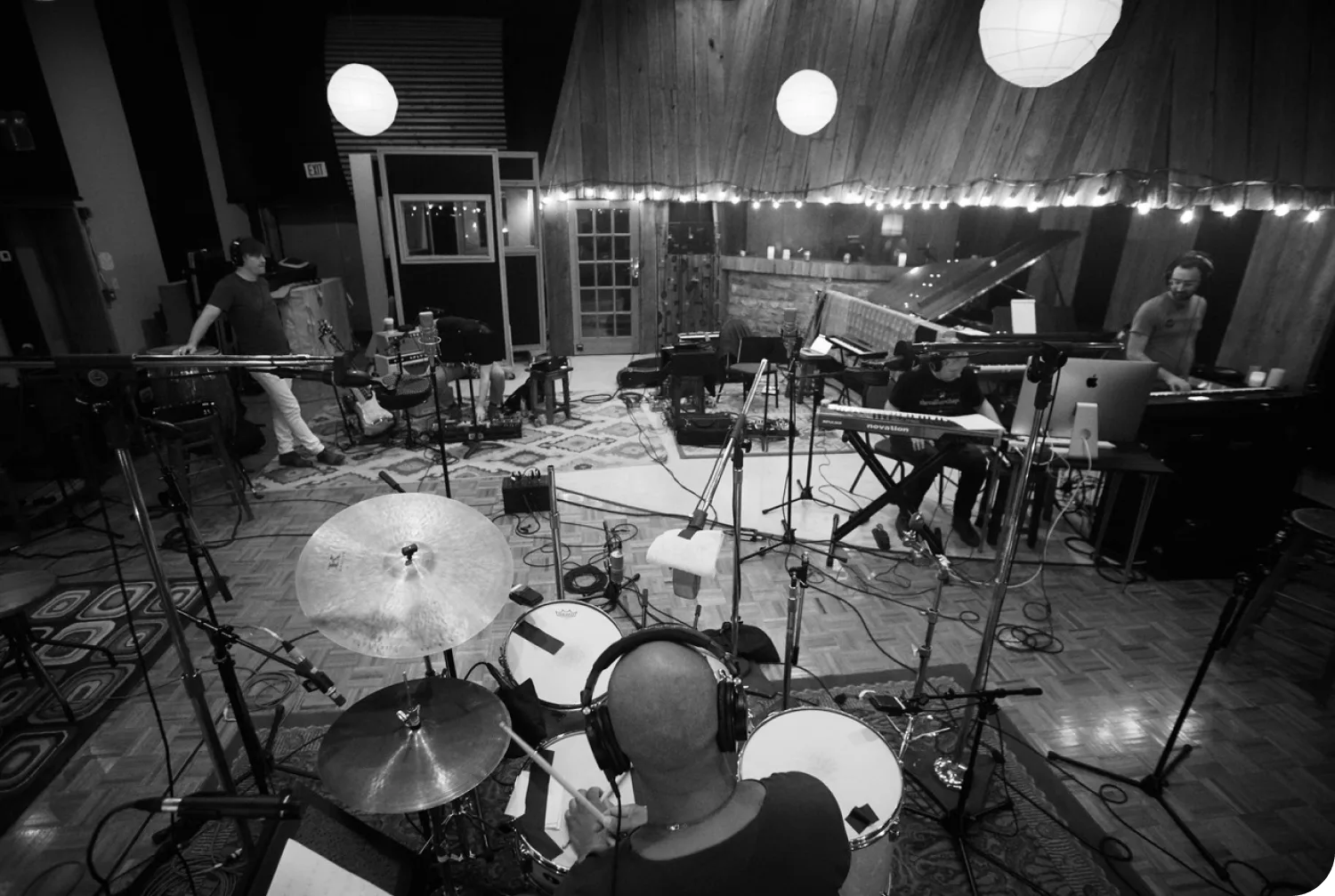
Recording in the studio.
“You can’t give up, give in, I swear you’ll see / Every hope will come to be.”
It was as if the people Dave read about in Performing Songwriter had stepped out of the pages to welcome him in.
And 20 years later, there’s no mistaking he’s part of it now. A few times in our interview he casually mentions people like his buddy Shay (of Dan + Shay) and his good friend Tyler (of Florida-Georgia Line), who also happens to be coming over right after I leave to be interviewed for Dave’s soon-to-be released podcast.
He doesn’t say their names like a name-dropper would, nor how a fan would, though it’s clear he deeply admires their artistry.
This is his community, and these are his colleagues. His family. They are his dream come true.
He never dreamed, though, that one day he’d be honored by that community via the Grammys.
It all started when country superstar Blake Shelton heard Dave’s song “God Gave Me You” on the radio. He loved it and recorded it on his next album. Then it got released as a single.
“I felt like I was watching a movie of my own life because none of that was planned or even mildly expected,” Dave remembers. “There was no sense of that when I started doing this; I had absolutely no concept that I was good enough to be at that level.”
Most things in a creative journey do happen slow – but they build the foundation for the life-changing moments that happen fast
Then one day his wife got an unexpected text from one of their friends in the music business: “What does it feel like to be married to a Grammy nominee?!”
It hadn’t even occurred to them to watch the Grammy announcements; they were sitting at home watching The Mentalist. Dave’s wife showed him the text.
He cried.
Then he made some calls to make sure it was really true.
It was.
Dave’s whole family went out to LA for the Grammys. It was a magical night.
But it also created new doubt.
For the first time Dave wondered if he was capable of more than even he believed. (On the Grammys red carpet when an interviewer asks, “Tell us what you’re doing here today!” Dave answers, “I snuck in.”)
After the Grammys, Dave couldn’t help but wonder: “What do I do now?”
“Sign up for the newsletter!”
The answer?
Keep writing songs for the fans who’d loved him all along.
When I ask Dave if email has been a part of his life as a musician even I am surprised by how he perks up in his chair and answers: “Always, always, always.”
Dave started collecting email addresses after his first shows. “I’d leave some shows with hundreds of emails.” He sent a lot of emails too.
His wife Annie was a subscriber in those early days before they were even dating, and he jokes that she was probably rolling her eyes at his emails like, “Oh, man. This guy.”
But for him, it was a priority from day one. “I was all about collecting emails and keeping people up to date.” Social media didn’t exist, and email was the only way you could truly stay up to date with an artist.
And even though the internet has changed drastically in the last 20 years, Dave has never stopped: “I’ve been sending emails for 20-plus years.”
He still writes all the copy in his emails too.
“I built my career on communication and accessibility. That was how I communicated from day one and it was integral to me that people knew that I was there. It’s still important to me that people feel like, ‘He’s around and he’ll respond to you.’”
“All of the goodbyes / Every heartbreak / They turn to magic.”
Before I leave this cozy music mecca to make sure my chair is free for Tyler, I ask Dave for any advice he has for creators who want to make a living doing something they love as much as he loves songwriting.
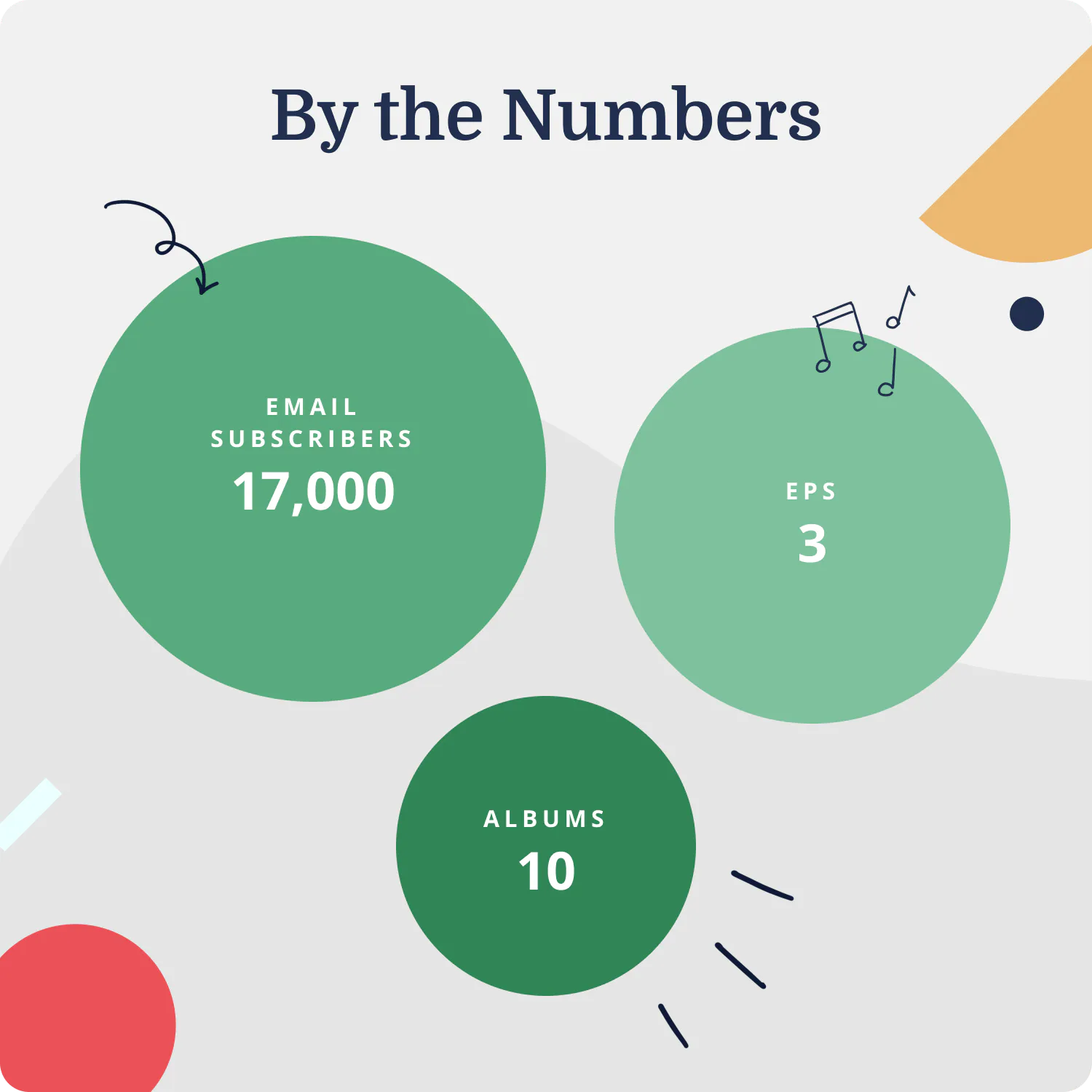
His answer: “Do your best to create things that really matter to people. I think that’s how you build a long career.”
The people who really stick around, especially in the music industry, Dave observes, are the ones who have music that “really connects. That people feel is necessary in their life. I think the best you can do is become a soundtrack in someone’s life.”
But how do you know if what you’re creating will matter to someone else?
You don’t.
At least not right away.
All you can do when you’re creating is ask yourself if it matters to you.
“Do I feel like this matters? Does it move me in some way? Because when it does, it has a much better chance of moving everybody else. When I write songs, I’m the first listener, so if it doesn’t matter to me, it’s never going to matter to somebody else.”
Dave’s fans play his songs at their weddings and as the background music to slideshows of their newborns. His songs become “theirs.”
Dave knows that can’t happen unless he keeps creating music that matters to him, and keeps letting it out into the world to give it the chance to matter to someone else.
And what keeps him grinding through that creative process after decades of ups and downs is the pure love of his craft. “When I write a song, I feel like I’m 10. You know? And sure, it’s sometimes hard to get down to it, but every time I do, that magic is still there.”
Lyrics above from Dreaming in Electric Blue and (Who Knew It Would Be So Hard) to Be Myself. You can sign up for Dave’s newsletter at davebarnes.com.
